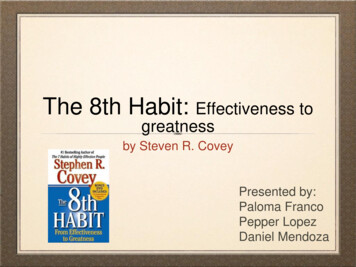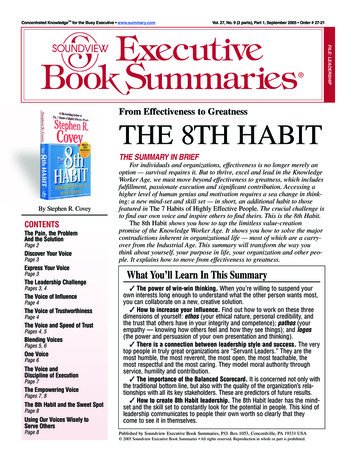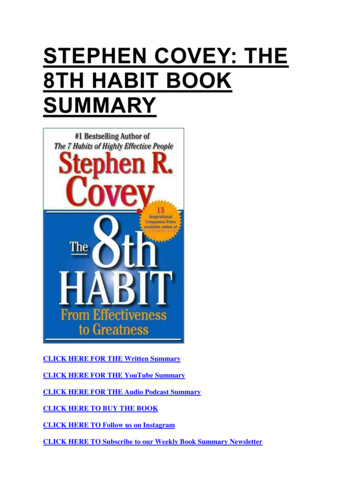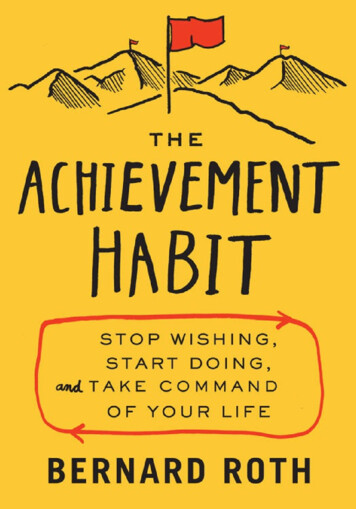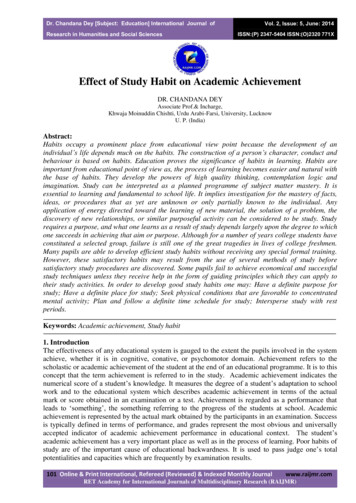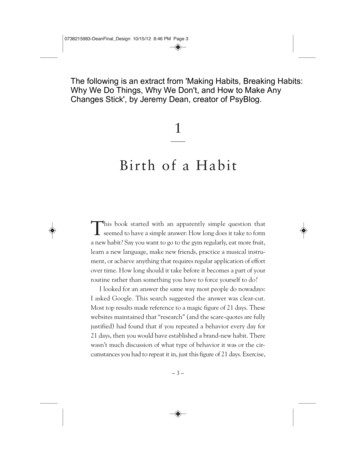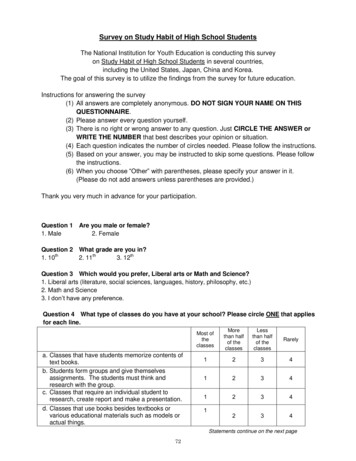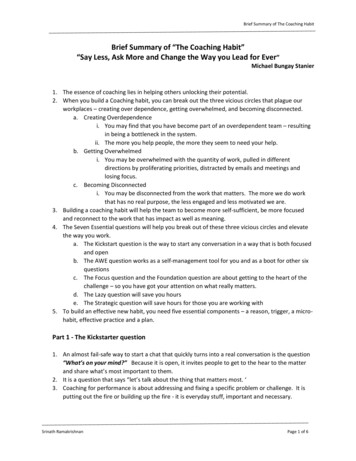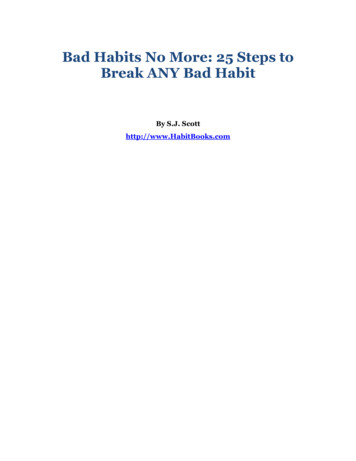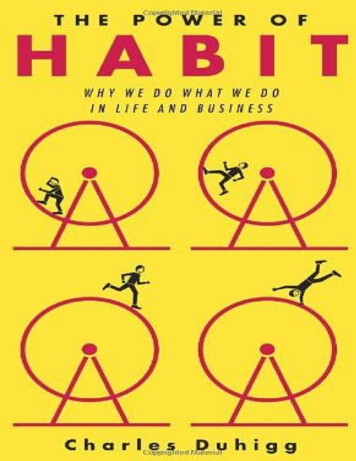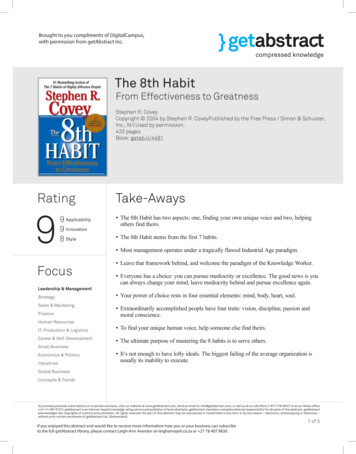
Transcription
Brought to you compliments of DigitalCampus,with permission from getAbstract Inc.The 8th HabitFrom Effectiveness to GreatnessStephen R. CoveyCopyright 2004 by Stephen R. CoveyPublished by the Free Press / Simon & Schuster,Inc., N.Y.Used by permission.432 pages[@] getab.li/4481Book:Rating99 Applicability9 Innovation8 StyleFocusLeadership & ManagementStrategySales & MarketingFinanceHuman ResourcesIT, Production & LogisticsCareer & Self-DevelopmentSmall BusinessEconomics & PoliticsIndustriesTake-Aways The 8th Habit has two aspects: one, finding your own unique voice and two, helpingothers find theirs. The 8th Habit stems from the first 7 habits. Most management operates under a tragically flawed Industrial Age paradigm. Leave that framework behind, and welcome the paradigm of the Knowledge Worker. Everyone has a choice: you can pursue mediocrity or excellence. The good news is youcan always change your mind, leave mediocrity behind and pursue excellence again. Your power of choice rests in four essential elements: mind, body, heart, soul. Extraordinarily accomplished people have four traits: vision, discipline, passion andmoral conscience. To find your unique human voice, help someone else find theirs. The ultimate purpose of mastering the 8 habits is to serve others. It’s not enough to have lofty ideals. The biggest failing of the average organization isusually its inability to execute.Global BusinessConcepts & TrendsTo purchase personal subscriptions or corporate solutions, visit our website at www.getAbstract.com, send an email to info@getabstract.com, or call us at our US office (1-877-778-6627) or at our Swiss office( 41-41-367-5151). getAbstract is an Internet-based knowledge rating service and publisher of book abstracts. getAbstract maintains complete editorial responsibility for all parts of this abstract. getAbstractacknowledges the copyrights of authors and publishers. All rights reserved. No part of this abstract may be reproduced or transmitted in any form or by any means – electronic, photocopying or otherwise –without prior written permission of getAbstract Ltd. (Switzerland).This summary is restricted to the personal use of Hennie Brittz (hennieb@lr.co.za)If you enjoyed this abstract and would like to receive more information how you or your business can subscribeto the full getAbstract library, please contact Leigh-Ann Arendse on leighanna@lr.co.za or 27 78 407 9830.LoginContext[cu 1202762,asp 3877,subs 3,free 0,lo en,co ZA] 2015-08-06 16:32:30 CEST1 of 5
getabstractgetabstractRelevancegetabstractWhat You Will LearnIn this summary, you will learn:r1) How to transform your life and your company by using the 8th Habit; 2) Howit incorporates and expands upon the 7 Habits; 3) How the Knowledge Worker Era is replacing the IndustrialAge; 4) How to develop your unique human voice and help others find theirs; and 5) How to make empowermentwork.getabstractReviewA cynic toward sequels would note that Steven Covey took only a little more than 300 pages to explain his first sevenhabits, but 409 pages and an accompanying CD to expound on the eighth. Cynicism aside, however, this book - this8th Habit - is worth every page. Give Covey credit. He could rest on his laurels and just write bland, non-threatening"how to lead" books and they would all be bestsellers. Covey eschews mediocrity, however, and tells it straight. Mostemployees experience considerable emotional pain working in their organizations, he says, because they are treatedas objects, not full human beings. Covey adds his prestige to the notion that the knowledge worker is a new model forchange in the unspoken, unwritten contract between employer and worker. He bases this fresh paradigm on respectfor the complete person - mind, body, heart and soul - not just the part that works from nine to five. Covey’s voiceis powerful and unique. He is committed to helping others find their unique voices as well. getAbstract recommendsthis highly for anyone in the getabstractModern BloodlettingThe problem with management is that it still works under the flawed IndustrialAge paradigm.“The 8th Habit.isabout seeing andharnessing the power ofa third dimension to the7 Habits that meets thecentral challenge of thenew Knowledge WorkerAge. This 8th Habit isto find your voice andhelp others find theirs.”“It is the voice ofthe human spirit- full of hope andintelligence, resilientby nature, boundlessin its potential toserve the commongood. This voice alsoencompasses the soul oforganizations that willsurvive, thrive and havea profound impact onthe future of the world.”The 8th HabitConsider that physicians in the Middle Age practiced bloodletting. As barbaric as that mayseem today, using leeches to draw blood from a sick person simply followed from the era'sparadigm that if you were ill, bad material was in your blood, so the blood must come out.After the advent of germ theory the paradigm shifted, saving millions of lives.A paradigm is powerful. The old Industrial Age paradigm held that people were an input,akin to raw materials such as steel and energy. People, therefore, were treated as things.They were not managed as whole individuals consisting of heart, mind, body and spirit,but rather as objects to be controlled and rarely trusted. While circumstances certainly havechanged since the advent of the Industrial Age, the basic paradigm continues. Workers areobjects, to be carefully scrutinized and managed in order to get them to perform effectively.This approach is increasingly dysfunctional in the Information or Knowledge Worker Age.Under the old approach, employees experience a great deal of pain and frustration at everycompany, no matter how successful. Fortunately, today the workplace paradigm is shifting,as expressed by the 8th Habit.The 8th Habit is not just 7 Habits plus one that got left behind. Instead, it calls for usinga "third dimension" of The 7 Habits of Highly Effective People. The 8th Habit means"finding your voice and helping others find theirs." And, in this context, "voice" is theunique personal significance each human offers, and can bring to bear at work.getAbstract 20142 of 5This summary is restricted to the personal use of Hennie Brittz (hennieb@lr.co.za)LoginContext[cu 1202762,asp 3877,subs 3,free 0,lo en,co ZA] 2015-08-06 16:32:30 CEST
“What happens whenyou manage peoplelike things? Theystop believing thatleadership can becomea choice.”“The fundamentalreality is, human beingsare not things needingto be motivated andcontrolled; they arefour dimensional body, mind, heart andspirit.”“The new KnowledgeWorker Age is basedon a new paradigm,one entirely differentthan the thing paradigmof the Industrial Age.Let’s call it the WholePerson Paradigm.”Making a DifferenceA full colonel with more than 30 years of service commanded a military base. Insteadof retiring, he decided to stay and push through a landmark cultural change inside hisorganization. He knew it would be a major battle. When asked why he didn't simply retireand avoid the mess altogether, the colonel explained that his father's last whispered wordson his deathbed were, "Son, don't do life like I did. I didn't do right by you or your motherand never really made a difference."The colonel explained that he was determined to implement cultural changes that wouldhave a positive impact on his command long after he was gone. Everyone has the choicethe colonel made: live with mediocrity or strive for greatness. The good news is that if youhave chosen mediocrity, it's never too late to turn back. You can choose greatness instead.Discovering Your VoiceFinding your unique voice means fulfilling your innate potential. The greatest gift youreceived at birth was the ability to decide whether to develop your fullest capacities.You have a choice in the space or time between every action and every reaction. Duringthat moment, reflect on what has happened and determine your response. The abilityto understand your free power of choice opens the door to four vital intelligencesor capabilities:1. Mind: IQ is mental intelligence - Many people stop here when evaluating intelligence,but it is too restrictive.2. Body: PQ is physical intelligence - This form of intelligence is often discounted,because it takes place without your conscious awareness. You do not have to think tobreathe or to make your heart beat. Yet this intelligence responds continuously to theenvironment to maintain health, ward off infection and so forth.3. Heart: EQ is emotional intelligence - You must be an aware, sensitive and empatheticperson to communicate with others on a genuine level. A person with a strong EQ knowswhat to say and when to say it, how to feel and how to express those feelings. Substantialevidence indicates that over the long run EQ is a stronger determinant of success than IQ.4. Spirit or soul: SQ is spiritual intelligence - This is the most central intelligence becauseit directs the activities of the other three. Our drive for meaning and purpose leads usto develop our SQ.Highest ExpressionsTo find your voice, you must be in touch with the four elements of a whole person: mind,body, heart and spirit. The consistent pattern in the lives of great achievers is that, throughstruggle and effort, they elevated the four intelligences to their highest manifestations:"vision, discipline, passion and conscience." They used four powerful combinations:“Enduring trust in arelationship cannotbe faked, and it israrely produced bya dramatic, onetimeeffort.”The 8th Habit1. Mind Vision - When the mind is fully developed you gain vision, the ability to discernthe highest potential in people, institutions, causes and enterprises. People who do notexercise the mind's ability to create, or who discourage it in others, suffer from a failureof vision. They are unable to see the wonderful possibilities within circumstances ofgreat need. Without vision, they slip into victimization.2. Body Discipline - You need discipline to transform vision into reality. Discipline isthe child born from the marriage of vision and commitment. You must have both.3. Heart Passion - Those who develop a wise heart will feel the passionate fire ofconviction, the flame that sustains the discipline needed to achieve the vision. Passionflows from finding and using your unique voice to accomplish great things.getAbstract 20143 of 5This summary is restricted to the personal use of Hennie Brittz (hennieb@lr.co.za)LoginContext[cu 1202762,asp 3877,subs 3,free 0,lo en,co ZA] 2015-08-06 16:32:30 CEST
4. Spirit Conscience - Developing your mental identity will lead you toward knowingthe right fork in the road, toward an inward moral compass that will guide you.“The compassis an excellentphysical metaphor forprinciples, because italways points north.The key to maintaininghigh moral authorityis to continually follow’true north’ principles.”Leadership DefinedUltimately, leadership is the ability to help people understand their own true worth andpotential, so they see it in themselves and live accordingly. The Industrial Age view of workfailed to nurture trust, placed the boss at the center of all activity, took power away frompeople and misaligned the interests of the individual and the organization. The alternativepath is practicing the 8th Habit, and the 7 Habits that preceded it. Begin with developingthe four intelligences, finding your voice and expressing it.To lead this journey, implement the 8th Habit in your interactions. Buckminster Fullerrequested the epitaph, "Just A Trim-Tab." A trim-tab on a boat or plane is the small rudderthat ultimately turns the whole machine. Successful organizations have many unheraldedtrim-tabbers who influence it by setting good examples. These individuals believe theyreally can make a difference.To be a leader, prove yourself trustworthy. Most leadership failures probably can be tracedback to failures of character. Every leader must exemplify core values such as keepingpromises and demonstrating honesty and integrity.Learning to EmpowerWhy should you empower others to find their voices? Well, consider the alternatives. Youcould try to lead them by controlling them. That rarely proves satisfactory. Or you couldabdicate responsibility, and let them do whatever they want. That hardly seems wise, either.“Spiritual intelligencealso helps us discerntrue principles that arepart of our conscience,which are symbolizedby the compass.”The solution is to give others "directed autonomy." Work with them to establish theirobjectives and then give them the autonomy to achieve those goals. A win-win agreementis neither a legal contract nor a job description. It is a psychological and social contractwritten into people's hearts and minds. Such an agreement endows your colleagues with ashared commitment toward the organization's highest priorities. Win-win empowerment isespecially valuable during evaluations. In a high-trust culture, people are far more likelyto appraise themselves effectively, particularly if you provide them with good 360-degreefeedback. Self-evaluation is usually the toughest.The Sweet SpotSo now that you understand the 8th Habit, how do you practice it? Here are some ideas:“Most people think ofleadership as a positionand therefore don’t seethemselves as leaders.”The 8th Habit "Modeling" - Prove yourself trustworthy through your actions, rather than imposingexpectations on others. Listen to others and practice behaviors that ultimately will give youmoral authority.getabstract "Pathfinding" - Create a sense of direction and order for your organization.getabstract "Aligning" - Help your organization be congruent with the spirit of trust andempowerment. Proper alignment results in institutional moral authority.getabstract "Empowering" - Accept the four elements of a person's nature - heart, mind, body,spirit - and embrace them. Have faith in people's ability to choose wisely for the
The 8th Habit is not just 7 Habits plus one that got left behind. Instead, it calls for using a "third dimension" of The 7 Habits of Highly Effective People. The 8th
